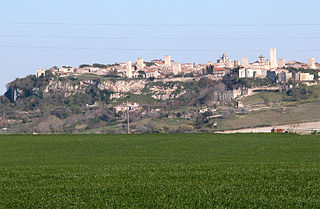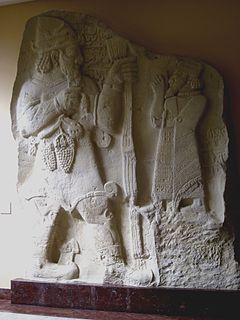The Domain Name System (DNS) is a hierarchical and decentralized naming system for computers, services, or other resources connected to the Internet or a private network. It associates various information with domain names assigned to each of the participating entities. Most prominently, it translates more readily memorized domain names to the numerical IP addresses needed for locating and identifying computer services and devices with the underlying network protocols. By providing a worldwide, distributed directory service, the Domain Name System has been an essential component of the functionality of the Internet since 1985.

The Etruscan civilization is the modern name given to a powerful and wealthy civilization of ancient Italy in the area corresponding roughly to Tuscany, south of the Arno river, western Umbria, northern and central Lazio, with offshoots also to the north in the Po Valley, in the current Emilia-Romagna, south-eastern Lombardy and southern Veneto, and to the south, in some areas of Campania. As distinguished by its unique language, this civilization endured from before the time of the earliest Etruscan inscriptions until its assimilation into the Roman Republic, beginning in the late 4th century BC with the Roman–Etruscan Wars.
A genus is a taxonomic rank used in the biological classification of living and fossil organisms, as well as viruses, in biology. In the hierarchy of biological classification, genus comes above species and below family. In binomial nomenclature, the genus name forms the first part of the binomial species name for each species within the genus.
Binomial nomenclature, also called binominal nomenclature or binary nomenclature, is a formal system of naming species of living things by giving each a name composed of two parts, both of which use Latin grammatical forms, although they can be based on words from other languages. Such a name is called a binomial name, a binomen, binominal name or a scientific name; more informally it is also called a Latin name. The first part of the name – the generic name – identifies the genus to which the species belongs, while the second part – the specific name or specific epithet – identifies the species within the genus. For example, humans belong to the genus Homo and within this genus to the species Homo sapiens. Tyrannosaurus rex is probably the most widely known binomial. The formal introduction of this system of naming species is credited to Carl Linnaeus, effectively beginning with his work Species Plantarum in 1753. But Gaspard Bauhin, in as early as 1623, had introduced in his book Pinax theatri botanici many names of genera that were later adopted by Linnaeus.

Tarragona is a port city located in northeast Spain on the Costa Daurada by the Mediterranean Sea. Founded before the 5th century BC, it is the capital of the Province of Tarragona, and part of Tarragonès and Catalonia. Geographically, it is bordered on the north by the Province of Barcelona and the Province of Lleida. The city has a population of 201,199 (2014).
A surname, family name, or last name is the portion of a personal name that indicates a person's family. Depending on the culture, all members of a family unit may have identical surnames or there may be variations based on the cultural rules.

Tages was a founding prophet of Etruscan religion who is known from reports by Latin authors of the late Roman Republic and Roman Empire. He revealed a cosmic view of divinity and correct methods of ascertaining divine will concerning events of public interest. Divination was undertaken in Roman society by priestly officials called haruspices. Political officials also, such as the augures, were constituted with some responsibilities for divination. While the religion flourished, these priests accompanied public officials, including generals in the field, and were consulted on everything of interest to the senate and people of Rome.
In Etruscan mythology, Tyrrhenus was one of the founders of the Etruscan League of twelve cities, along with his brother Tarchon. Herodotus describes him as the saviour of the Etruscans, because he led them from Lydia to Etruria; however this Lydian origin is to be debated as it contradicts cultural and linguistic evidence, as well as the view held by both the Etruscans themselves and by other Etrusco-Roman and Greek ancient sources. His name was given to the Etruscan people by the Greeks. The Romans extended this use to the sea west of Etruria: the Tyrrhenian Sea.

A given name is a part of a person's personal name. It identifies a specific person, and differentiates that person from the other members of a group who have a common surname. The term given name refers to the fact that the name usually is bestowed upon a person, normally to a child by his or her parents at or close to the time of birth. A Christian name, a first name which historically was given at baptism, is now also typically given by the parents at birth.

In the religion of Ancient Rome, a haruspex was a person trained to practice a form of divination called haruspicy (haruspicina), the inspection of the entrails of sacrificed animals, especially the livers of sacrificed sheep and poultry.
The reading of omens specifically from the liver is also known by the Greek term hepatoscopy.

Tarquinia, formerly Corneto, is an old city in the province of Viterbo, Lazio, Italy known chiefly for its ancient Etruscan tombs in the widespread necropoleis or cemeteries which it overlies, for which it was awarded UNESCO World Heritage status.
Play It Loud! Festival was a heavy metal festival held annually in Orzinuovi, Italy since 2007. It is organized by the My Graveyard Productions independent record label. The festival has up-and-coming bands from Italy and Europe, re-united Italian metal acts from the 80s and old-school international metal acts from the past. The first edition featured NWOBHM legends Blitzkrieg and Raven, while the second hosted the likes of Elixir, Cloven Hoof, Helstar and Manilla Road. The third edition of the festival took place on February, 2009, and it will be co-headlined by Exciter and Jag Panzer.
Argidia is a genus of moths of the Noctuidae family.
In the 8th century BC, the Etruscans expanded their power to Northern and Southern Italy, specifically towards Emilia and Campania, there they founded Etruscan dominions who are modernly known under the names of Padanian Etruria and Campanian Etruria. Moving from the northern city-states of the Tuscanian Dodecapolis they swept into the Po valley through the Apennine passes.

Prothysana is a genus of moths of the family Bombycidae. It contains two species, whose larvae are known as shag-carpet caterpillars. They are found from Mexico, south to Panama and into South America, at least to Ecuador.







